Governance of tenure newsletter
1. STORIES FROM COUNTRIES: USING THE VOLUNTARY GUIDELINES
Sierra Leone establishes an Inter-Ministerial Task Force
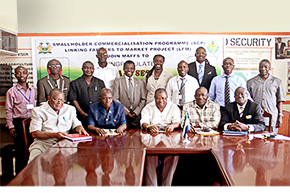 In May the Government of Sierra Leone demonstrated its commitment for the implementation of the Voluntary Guidelines by establishing an Inter-Ministerial Task Force of four key ministries: Agriculture, Forestry and Food Security; Lands, Country Planning and the Environment; Fisheries and Marine Resources; and Justice. The Task Force is chaired by the Minister of Agriculture, Forestry and Food Security, Dr. Joseph Sam Sesay, for six months, after which the responsibility for the chair will rotate. The Ministry of Lands, Country Planning and the Environment will host the secretariat for the Voluntary Guidelines initiative and ensure coordination, ownership and transfer of knowledge and skills among all relevant stakeholders.
In May the Government of Sierra Leone demonstrated its commitment for the implementation of the Voluntary Guidelines by establishing an Inter-Ministerial Task Force of four key ministries: Agriculture, Forestry and Food Security; Lands, Country Planning and the Environment; Fisheries and Marine Resources; and Justice. The Task Force is chaired by the Minister of Agriculture, Forestry and Food Security, Dr. Joseph Sam Sesay, for six months, after which the responsibility for the chair will rotate. The Ministry of Lands, Country Planning and the Environment will host the secretariat for the Voluntary Guidelines initiative and ensure coordination, ownership and transfer of knowledge and skills among all relevant stakeholders.
The Ministers are committed to seeing the incorporation of the Voluntary Guidelines in relevant legislation currently under review, including the Fisheries Bill, Land Policy, Forestry Bill and the General Registration Act Chapters 255 and 256. The Voluntary Guidelines served as a reference during the final consultations on the draft National Land Policy on 11 May. The initiative has received technical support from FAO and financial support from Germany.
Liberia resumes implementation of the Voluntary Guidelines
The Voluntary Guidelines Task Force, established in 2014 after a national awareness raising workshop, has resumed operations that had been put on hold because of the Ebola emergency. The Task Force drafted Terms of Reference for a more formal Steering Committee to use the Voluntary Guidelines in addressing the challenges of governance of natural resources, identified the Land Commission as the institutional home, and designed a road-map for activities. Three priority areas have been identified: customary tenure rights and responsibilities in land, fisheries and forests; concessions and benefit sharing; and a mechanism for grievance and dispute resolution. Technical support was received from FAO and financial support from Germany.
Civil society develops capacity in Malawi, Myanmar, Niger, Senegal and South Africa
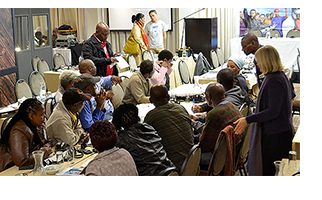 Training materials were developed and used to increase the use of the Voluntary Guidelines by civil society organizations in five countries: Malawi, Myanmar, Niger, Senegal and South Africa. Between 60 and 100 people in each country have been trained to be trainers, which is leading to around 200 to 2 500 people in each country being sensitized on the Voluntary Guidelines through meetings, radio programmes, videos and newsletters. In addition, work will be starting in Guatemala and Nepal.
Training materials were developed and used to increase the use of the Voluntary Guidelines by civil society organizations in five countries: Malawi, Myanmar, Niger, Senegal and South Africa. Between 60 and 100 people in each country have been trained to be trainers, which is leading to around 200 to 2 500 people in each country being sensitized on the Voluntary Guidelines through meetings, radio programmes, videos and newsletters. In addition, work will be starting in Guatemala and Nepal.
The modular training framework helps participants to link the Voluntary Guidelines to their own situation and to prepare plans for using the Guidelines in their work and activities. It has helped to improve dialogue among civil society organizations, and between these organizations and governments. By being better prepared, civil society can increase its participation into national dialogues and help governments in conducting assessments and reforms on governance of tenure.
The training helped South African participants from small-scale fisheries and land sectors to recognise the similarities in the challenges they face. In Malawi, the Voluntary Guidelines were introduced into action plans related to climate change, HIV-AIDS and gender equity. Participants in Senegal created an action plan to use the Voluntary Guidelines in the national reform process, and in Myanmar the action plan was designed to feed into the current land policy process. The work is being implemented by FAO together with IPC and FIAN working with country partners, and with financial support from the Kingdom of Belgium.
New video: "Open Tenure: A means to empower communities"
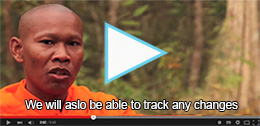 A new video shows Open Tenure being used by a community forestry group in northwest Cambodia to collect information on their tenure rights. Open Tenure empowers communities and individual citizens to map and record tenure claims and contributes to safeguarding their security of tenure. It uses hand-held tablets, open source software and a community server.
A new video shows Open Tenure being used by a community forestry group in northwest Cambodia to collect information on their tenure rights. Open Tenure empowers communities and individual citizens to map and record tenure claims and contributes to safeguarding their security of tenure. It uses hand-held tablets, open source software and a community server.
2. GETTING TOGETHER: EVENTS ON THE VOLUNTARY GUIDELINES
Global Soil Week, Germany (19-23 April)
 There was strong consensus at the third Global Soil Week in Berlin that the translation of the Voluntary Guidelines to national policies and local practices is crucial for the implementation of the Sustainable Development Goals (SDGs). A number of strategies were identified to increase political buy-in for the Voluntary Guidelines at the national level, such as showcasing their value for other policies and exploring entry-points for legislative review. International financial institutions committed to adapting their standards to the Voluntary Guidelines. Participants affirmed that inclusive multi-stakeholder processes are key to achieving lasting effects. Read the session report. The film “Better save soil” was premiered at the event and places long-term secure tenure as the foundation for sustainable management of soils.
There was strong consensus at the third Global Soil Week in Berlin that the translation of the Voluntary Guidelines to national policies and local practices is crucial for the implementation of the Sustainable Development Goals (SDGs). A number of strategies were identified to increase political buy-in for the Voluntary Guidelines at the national level, such as showcasing their value for other policies and exploring entry-points for legislative review. International financial institutions committed to adapting their standards to the Voluntary Guidelines. Participants affirmed that inclusive multi-stakeholder processes are key to achieving lasting effects. Read the session report. The film “Better save soil” was premiered at the event and places long-term secure tenure as the foundation for sustainable management of soils.
Working groups discussed how the Voluntary Guidelines could be mainstreamed throughout the lending practices of German financial cooperation and reviewed the drafts of technical guides on commons and for the private sector.
Gender learning programme, Mongolia (3-15 May and 3-6 June)
A learning programme on “Governing land for women and men” provided an opportunity for 26 representatives from government, civil society, private sector and academia to develop capacities to support the implementation of the Voluntary Guidelines in a gender-sensitive way. The learning programme included an on-line course in May and a four day workshop in Ulaanbaatar in June. The participants increased their knowledge on key land and gender issues in the country, interacted and fostered collaboration with other stakeholders, and enhanced their soft skills. During the workshop, they prepared work plans to start translating their new knowledge into action. The participants were able to seek further guidance and advice through an online mentoring phase for another month.
The learning programme was designed by FAO and implemented in Mongolia in partnership with the Ministry of Food and Agriculture, the Gender Equality Committee and People Centered Conservation in Mongolia, and with the financial support of the German Government and the UK Department for International Development.
ILC Global Forum, Senegal (12-16 May)
About 700 people from around the world travelled to Dakar to participate in the Global Land Forum on land governance for inclusive development, justice and sustainability. Special emphasis was given to Africa on 12 May. The Voluntary Guidelines featured prominently, with the functions and roles of national multi-stakeholder platforms being linked to other national processes to obtain synergies. Civil society organizations presented a variety of initiatives on the Voluntary Guidelines ranging from awareness raising (Landnet, Malawi; CINEP, Colombia: AFA, Asia) through to monitoring land reform processes (ANGOC, the Philippines). Open Tenure, the open source software that allows communities to collect information on their rights, was demonstrated during the ideas fair.
The training helped South African participants from small-scale fisheries and land sectors to recognise the similarities in the challenges they face. In Malawi, the Voluntary Guidelines were introduced into action plans related to climate change, HIV-AIDS and gender equity. Participants in Senegal created an action plan to use the Voluntary Guidelines in the national reform process, and in Myanmar the action plan was designed to feed into the current land policy process. The work is being implemented by FAO together with IPC and FIAN working with country partners, and with financial support from the Kingdom of Belgium.
Conference on property valuation and taxation, Lithuania (3-15 June)
The Conference on Property Valuation and Taxation for Fiscal Sustainability and Improved Governance in Europe and Central Asia, held in Vilnius, was attended by 120 people from 26 countries. Valuation and taxation are two of the areas addressed in the Voluntary Guidelines (in sections 18 and 19) and also make an important contribution to other areas covered in the Guidelines, such as expropriation and compensation, restitution and land consolidation. The participants represented national cadastres and land registries, land boards, tax authorities, ministries of finance, ministries of justice, professional bodies, valuation companies, universities, think tanks and aid agencies. The conference was organized by the World Bank, FAO, and the Lithuanian Centre of Registers. The presentations, case studies, and supplementary material are available at http://bit.ly/1Rfqt9R
A special themed edition of the FAO Land Tenure Journal with versions of the case studies will be published later this year (see http://bit.ly/1NHSbpD)
Mainstreaming the Voluntary Guidelines, Colombia (12–13 June)
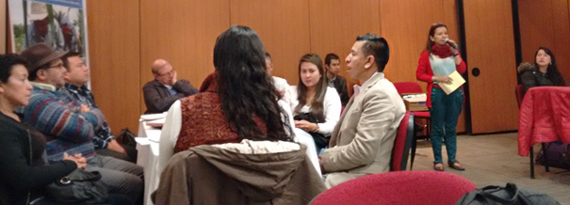 Over 70 participants representing Government institutions, the private sector and farmer organizations gathered in Bogotá to discuss how the Voluntary Guidelines may be integrated into national policies and programmes dealing with land tenure and natural resource management. Participants agreed that the Voluntary Guidelines provides a useful platform to address major issues concerning land governance, including access to land, land restitution to land holders who were displaced by the conflict in the past and natural resource management (i.e. land, fisheries, forests and water). They recognized that the integration of the Voluntary Guidelines into the existing land policy framework may help improve tenure security, which is basic to address other issues such as investments in agriculture and natural resource use.
Over 70 participants representing Government institutions, the private sector and farmer organizations gathered in Bogotá to discuss how the Voluntary Guidelines may be integrated into national policies and programmes dealing with land tenure and natural resource management. Participants agreed that the Voluntary Guidelines provides a useful platform to address major issues concerning land governance, including access to land, land restitution to land holders who were displaced by the conflict in the past and natural resource management (i.e. land, fisheries, forests and water). They recognized that the integration of the Voluntary Guidelines into the existing land policy framework may help improve tenure security, which is basic to address other issues such as investments in agriculture and natural resource use.
The workshop was organized by FAO and planning is underway for another workshop to further mainstream the Voluntary Guidelines in policies and programmes, including with the participation of local institutions.
3. PARTNERSHIPS WITH THE VOLUNTARY GUIDELINES
Ekta Parishad reports on using the Voluntary Guidelines
The Voluntary Guidelines are creating hope in land rights movements in India. Ekta Parishad, in cooperation with FAO, has produced a Hindi translation of the Voluntary Guidelines which is being used widely by land rights activists in their advocacy campaigns. Ekta Parishad used the Voluntary Guidelines in advocacy efforts with the State, and at various levels of mass actions for a National Land Reform Policy and a National Homestead Rights Act in order to promote land tenure rights for millions of land-deprived people. There are plans to promote the Voluntary Guidelines among state institutions and decision-makers in order to raise awareness about issues related to land tenure and food security, as well as for a series of peoples’ consultations for opening discussions on the Voluntary Guidelines and using them effectively in various levels of mass movements and in dialogue with the states.
ANGOC reports on using the Voluntary Guidelines
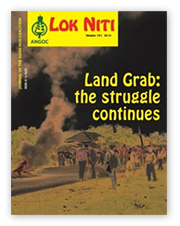 As part of its efforts to monitor the implementation of the Voluntary Guidelines, the Asian NGO Coalition for Agrarian Reform and Rural Development (ANGOC) initiated studies of land acquisitions in seven countries: Bangladesh, Cambodia, India, Indonesia, Nepal, Pakistan, and the Philippines. The collected data were compiled and published in the ANGOC Lok Niti Journal. The cases identify negative effects such as the displacement of farmers, women, and indigenous peoples from their lands; the destruction of ecosystems; the reduction of food security; and the loss of livelihoods.
As part of its efforts to monitor the implementation of the Voluntary Guidelines, the Asian NGO Coalition for Agrarian Reform and Rural Development (ANGOC) initiated studies of land acquisitions in seven countries: Bangladesh, Cambodia, India, Indonesia, Nepal, Pakistan, and the Philippines. The collected data were compiled and published in the ANGOC Lok Niti Journal. The cases identify negative effects such as the displacement of farmers, women, and indigenous peoples from their lands; the destruction of ecosystems; the reduction of food security; and the loss of livelihoods.
Capacity development programme for indigenous peoples
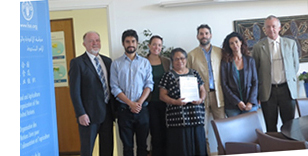 A capacity development programme on the Voluntary Guidelines designed with and for indigenous peoples has been initiated in partnership with FAO. Its main objective is to increase indigenous peoples’ understanding of the Voluntary Guidelines and their potential use to secure and safeguard their tenure rights. At the end of the programme the participants will replicate the training in their respective communities, with a focus on applying the Voluntary Guidelines effectively to address their existing tenure issues.
A capacity development programme on the Voluntary Guidelines designed with and for indigenous peoples has been initiated in partnership with FAO. Its main objective is to increase indigenous peoples’ understanding of the Voluntary Guidelines and their potential use to secure and safeguard their tenure rights. At the end of the programme the participants will replicate the training in their respective communities, with a focus on applying the Voluntary Guidelines effectively to address their existing tenure issues.
The programme brings together 24 indigenous leaders from Honduras, El Salvador, Costa Rica, Guatemala, Nicaragua and Panama. A workshop in September will be followed by research on tenure in the participants’ respective communities. The training will take place in Nicaragua’s North Caribbean Coast Autonomous Region, where the Centro para la Autonomía y Desarrollo de los Pueblos Indígenas (CADPI), will share its experience on territorial governance.
USAID marks three years of the Voluntary Guidelines
 On 7 May, USAID marked the three year anniversary of the endorsement of the Voluntary Guidelines with an online panel discussion titled “Why Land Still Matters: Three Years of the Voluntary Guidelines – Where We Are and Where We Are Going?”. Panellists from FAO, the Africa Land Policy Initiative and the International Land Coalition (ILC) shared progress, lessons learned and challenges from three years of support for the implementation of the Voluntary Guidelines, and discussed the next steps and future directions.
On 7 May, USAID marked the three year anniversary of the endorsement of the Voluntary Guidelines with an online panel discussion titled “Why Land Still Matters: Three Years of the Voluntary Guidelines – Where We Are and Where We Are Going?”. Panellists from FAO, the Africa Land Policy Initiative and the International Land Coalition (ILC) shared progress, lessons learned and challenges from three years of support for the implementation of the Voluntary Guidelines, and discussed the next steps and future directions.
4. SUPPORT FOR THE VOLUNTARY GUIDELINES
G7 Leaders support implementation of the Voluntary Guidelines
 G7 leaders reaffirmed their support for the implementation of the Voluntary Guidelines, while building upon their existing wide range of interventions for food security. The summit took place on 7-8 June in Schloss Elmau, Germany. The Annex to the G7 Leaders’ Declaration calls for the consistent implementation and alignment of official development assistance supported investments with the Voluntary Guidelines and the CFS Principles for Responsible Investment in Agriculture and Food Systems. It recognises that the responsible governance of tenure of land is crucial for socially equitable agricultural development and for attracting investment. The G7 members affirm they will continue their support of partner countries in their implementation of the Voluntary Guidelines, continue with the existing G7 Land Partnerships and seek to add new ones where appropriate.
G7 leaders reaffirmed their support for the implementation of the Voluntary Guidelines, while building upon their existing wide range of interventions for food security. The summit took place on 7-8 June in Schloss Elmau, Germany. The Annex to the G7 Leaders’ Declaration calls for the consistent implementation and alignment of official development assistance supported investments with the Voluntary Guidelines and the CFS Principles for Responsible Investment in Agriculture and Food Systems. It recognises that the responsible governance of tenure of land is crucial for socially equitable agricultural development and for attracting investment. The G7 members affirm they will continue their support of partner countries in their implementation of the Voluntary Guidelines, continue with the existing G7 Land Partnerships and seek to add new ones where appropriate.
Read the Declaration | Read the Annex to the Declaration
5. TECHNICAL PUBLICATIONS ON THE VOLUNTARY GUIDELINES
Now available online: New issue of the Land Tenure Journal on Disaster Risk Management
 The newly issued edition of the Land Tenure Journal features a collection of articles addressing land tenure issues within the Disaster Risk Management (DRM) framework of pre-disaster prevention, mitigation and preparedness, emergency response, post-disaster recovery and reconstruction. The journal includes three articles that address aspects of spatial information, land valuation and land-use planning in the context of DRM. These are supplemented by two articles on experiences with natural disaster events and suggestions for addressing tenure security issues to improve resilience to natural disasters in two of the most disaster-prone regions of the world: islands of the Pacific and the Caribbean.
The newly issued edition of the Land Tenure Journal features a collection of articles addressing land tenure issues within the Disaster Risk Management (DRM) framework of pre-disaster prevention, mitigation and preparedness, emergency response, post-disaster recovery and reconstruction. The journal includes three articles that address aspects of spatial information, land valuation and land-use planning in the context of DRM. These are supplemented by two articles on experiences with natural disaster events and suggestions for addressing tenure security issues to improve resilience to natural disasters in two of the most disaster-prone regions of the world: islands of the Pacific and the Caribbean.
